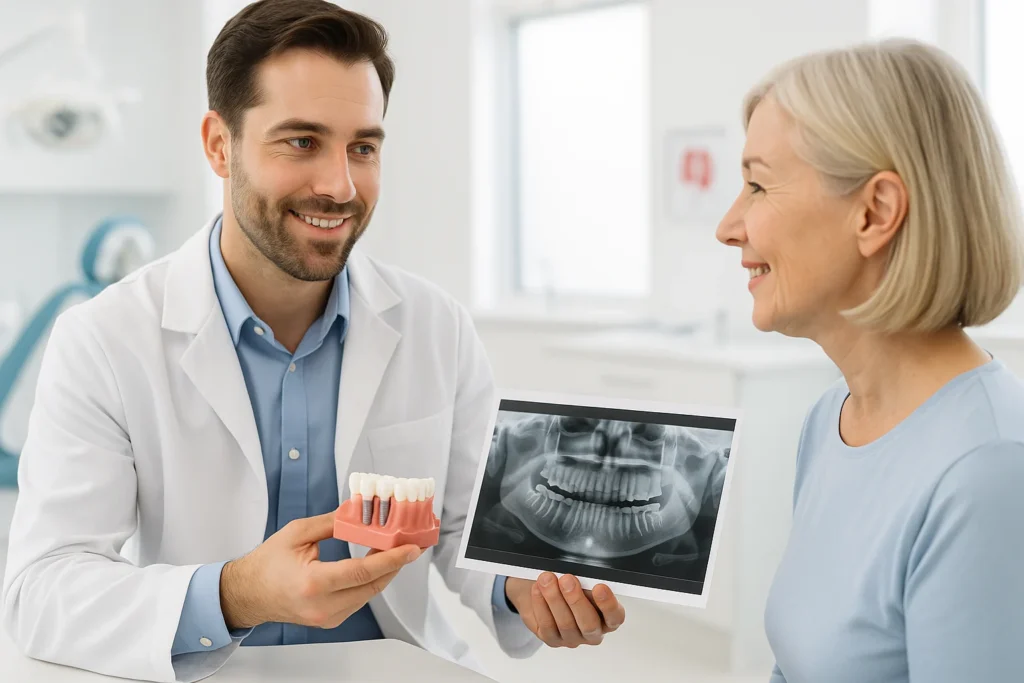Dental implants have revolutionized teeth replacement, offering a stable and durable solution for those who have lost most or all of their teeth. Whether you’re looking at all-on-4 dental implants, all-on-6 implants, or full arch dental implants, this article will guide you through what to expect. This transformative technology not only restores function but also significantly enhances the aesthetics of your smile, making it a preferred choice for many.
Full mouth reconstruction involves replacing all of the teeth in your mouth. This procedure is often necessary for individuals who have lost teeth due to decay, trauma, or gum disease. It can also be beneficial for those with severely worn teeth from grinding. Comprehensive in nature, full mouth reconstruction doesn’t just focus on teeth replacement but also addresses other oral health issues that might be affecting your overall dental well-being.
What Are Dental Implants?
Dental implants are artificial tooth roots made of titanium that are surgically placed into the jawbone. They provide a strong foundation for fixed or removable replacement teeth, which are made to match your natural teeth. This integration with the jawbone ensures a level of stability and durability that is unmatched by other tooth replacement options, allowing for normal chewing and speaking functions without discomfort or inconvenience.
The Process of Full Mouth Reconstruction
The process of full mouth reconstruction with dental implants is comprehensive and involves several stages. Here is a breakdown of what you can expect:
Consultation and Planning
The first step is a thorough examination by your dentist. This includes X-rays and 3D images to assess the health of your jawbone and create a detailed plan for your reconstruction. Your dentist will discuss your options, such as all-on-4 or all-on-6 implants, and help you choose the best solution for your needs. This initial stage is crucial as it sets the foundation for a successful outcome, addressing any preliminary concerns and customizing the procedure to your specific oral anatomy.
During this phase, your dentist will also evaluate your overall health to ensure you are a suitable candidate for surgery. Conditions like diabetes or habits such as smoking can affect healing, so these factors need to be considered to mitigate any potential risks. This comprehensive assessment ensures that the procedure is tailored to deliver optimal results safely.
Implant Placement
During the surgical procedure, the dental implants are placed into the jawbone. This may involve placing four implants (all-on-4) or six implants (all-on-6) per arch, depending on the structure of your jaw and your specific needs. The procedure is typically done under local anesthesia or sedation. This ensures patient comfort while the precision placement of implants is carried out, creating a robust foundation for your new teeth.
The accuracy of the implant placement is critical to the success of the procedure, as it affects the overall function and appearance of the final restoration. Advanced technology, including computer-guided surgery, is often used to enhance the precision and outcomes of the implant placement, reducing the risk of complications and improving recovery times.
Healing and Osseointegration
After the implants are placed, a process called osseointegration begins. This is when the jawbone grows around the implant, integrating it securely. This healing phase can take several months, but it is crucial for the stability of the implants. During this time, the implants become a permanent part of your jawbone, providing the strength and stability required for daily activities.
It is important to follow your dentist’s post-operative care instructions during this period to facilitate optimal healing. Regular check-ups will be scheduled to monitor progress and ensure that the implants are integrating as expected. Patience during this phase is rewarded with long-lasting results, as successful osseointegration is key to the durability and effectiveness of your new teeth.
Attaching the Abutments
Once osseointegration is complete, abutments (connectors) are attached to the implants. These serve as the base for the new teeth. This step is a minor surgical procedure, usually performed under local anesthesia, where the gum is reopened to expose the implants and attach the abutments.
The placement of the abutments is an exciting stage as it marks the transition from healing to restoration. With the abutments in place, you are one step closer to having your new teeth fitted, bringing you closer to the final outcome of your full mouth reconstruction.
Placing the New Teeth
Finally, your new teeth, or prosthetics, are attached to the abutments. These can be fixed dentures or individual crowns, depending on your preference and the recommendation of your dentist. This final stage is where the aesthetic and functional goals of the procedure come to fruition, as the prosthetics are designed to blend seamlessly with your natural features.
The customization of these prosthetics ensures that they not only look natural but also fit comfortably, allowing you to eat, speak, and smile with confidence. Your dentist will ensure that the bite is properly aligned and make any necessary adjustments to guarantee optimal comfort and functionality.
Benefits of Full Mouth Reconstruction with Dental Implants
Choosing dental implants for full mouth reconstruction offers several benefits:
Improved Functionality
Implants provide a stable base for your teeth, allowing you to chew and speak more effectively than with traditional dentures. This stability enhances your quality of life, eliminating the inconveniences associated with removable dentures, such as slippage and discomfort.
Moreover, the enhanced functionality translates into a wider variety of dietary options, as you can bite and chew foods that might have been challenging with conventional dentures. This can contribute to improved nutrition and overall health, as you can enjoy a balanced diet without restrictions.
Enhanced Aesthetics
Dental implants look and feel like natural teeth, improving your appearance and boosting your confidence. The natural appearance of implants can have a transformative effect on your self-esteem, allowing you to smile freely without self-consciousness.
The customization involved in the creation of the prosthetics ensures that they are tailored to complement your facial features, enhancing your overall appearance. This improvement in aesthetics can have a positive impact on both your personal and professional interactions, as a confident smile often leaves a lasting impression.
Long-lasting Solution
With proper care, dental implants can last a lifetime, making them a cost-effective solution in the long run. Unlike traditional dentures that may need frequent adjustments or replacements, dental implants offer durability and reliability, reducing the need for ongoing maintenance.
The long-term success of implants depends on good oral hygiene practices and regular dental check-ups, ensuring that they remain in excellent condition over the years. This longevity makes them a wise investment for those seeking a permanent solution to tooth loss.
Bone Health Preservation
Implants help preserve the jawbone and prevent further deterioration that can occur with missing teeth. This preservation of bone health is a significant advantage over dentures, which can contribute to bone loss over time due to lack of stimulation.
By maintaining the structure of the jawbone, implants support the overall facial structure, preventing the sagging or hollow appearance that can accompany bone loss. This not only improves aesthetics but also contributes to better oral health and function in the long term.

Comparing Fixed Dentures and Implants
When considering full mouth reconstruction, you might wonder whether to choose fixed dentures or implants. Here’s a quick comparison:
- Stability: Implants are more stable than dentures, which can slip or move. This stability is crucial for daily activities, providing confidence and comfort in social and professional settings.
- Comfort: Implants are more comfortable, as they don’t irritate the gums like dentures can. This comfort leads to better overall satisfaction with the dental restoration, as there is no need for adhesives or frequent adjustments.
- Maintenance: While both require regular cleaning, implants are generally easier to care for. The ease of maintenance further enhances the appeal of implants, as they integrate into daily oral hygiene routines without additional steps.
- Longevity: Implants tend to last longer than dentures, which may need to be replaced every few years. This longevity, coupled with the reduction in ongoing costs, makes implants a financially sound choice for many patients.
Costs Involved in Full Mouth Reconstruction
The cost of full mouth reconstruction with dental implants can vary widely depending on several factors, including the type of implants used and the complexity of the procedure. Here’s a general idea of what to expect:
Factors Affecting Cost
- Number of Implants: More implants generally mean higher costs. The number of implants required depends on individual needs and the chosen treatment plan.
- Materials Used: The quality of materials for the prosthetics can affect the price. High-quality materials ensure durability and a natural appearance, justifying their cost.
- Location: Costs can vary based on geographic location and the dentist’s expertise. Urban areas may have higher costs due to increased overhead, while specialized practitioners might charge more for their expertise.
- Additional Procedures: Bone grafts or sinus lifts, if necessary, can add to the cost. These procedures are sometimes required to ensure a successful outcome, particularly in cases of significant bone loss.
Average Cost
The cost for a full mouth reconstruction can range from $20,000 to $50,000 or more. It’s important to discuss with your dentist and get a detailed estimate before proceeding. Many dental practices offer financing options or payment plans to help make the cost more manageable.
Insurance may cover some aspects of the procedure, depending on the policy, so it’s advisable to consult with your provider. Understanding the financial aspects upfront can help you plan effectively, ensuring that you can proceed with confidence.
Recovery After Full Mouth Implants
Recovery after full mouth reconstruction with dental implants involves several stages:
Initial Recovery
After the implant surgery, you may experience some swelling and discomfort, which can be managed with pain medication and ice packs. Most people return to normal activities within a few days. Following the post-operative care instructions provided by your dentist is crucial to minimize any complications and promote healing.
Your dentist will provide specific guidelines on diet and oral hygiene during the initial recovery phase. Soft foods and gentle oral care are recommended to avoid disturbing the surgical sites, allowing for a smooth recovery process.
Long-term Care
Taking care of your implants involves regular brushing, flossing, and dental check-ups. Maintaining good oral hygiene is essential to prevent infection and ensure the longevity of your implants. Regular professional cleanings and examinations help monitor the health of your implants and surrounding tissues.
Adopting a consistent oral care routine and addressing any dental concerns promptly can prevent complications and maintain the health of your implants. This commitment to long-term care ensures that you can enjoy the benefits of your investment for many years to come.
Conclusion
Full mouth reconstruction with dental implants is a significant investment in your oral health and quality of life. By understanding the process, benefits, and costs, you can make an informed decision that best suits your needs. Whether you opt for all-on-4, all-on-6, or another implant solution, you’ll be on your way to a healthier, more confident smile. Embracing this transformative dental solution not only restores function and aesthetics but also enhances your overall well-being, allowing you to live life to the fullest with renewed confidence.



